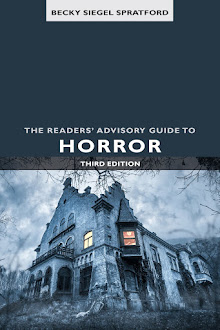I met Steve, one of the two hosts of Horror Makes Us Happy, at StokerCon in Pittsburgh this past June. After learning about Steve and Chris' podcast I agreed to be a guest. That appearance drops today.
But before we get to that, I want to talk about how interesting the podcast Steve and Chris put out is. In their own words, "We (lightly) psychologically profile creators in the horror biz to uncover the REAL reasons people love horror."
But it's is more than how unique their podcast is, Steve and Chris are also super professional. After meeting Steve, I got an official invite with a power point explaining who they are and what their goals are. Here is some sample language from the ppt:
The format:
We dig into the horror you love – from childhood, through teen years, into adulthood
– building a light/amateur psychological profile as we go. We look for reoccurring
themes that point to any core values/beliefs/interests you hold as a human being –
sometimes ones you haven't even noticed yourselves!
The hosts:
Steve and Chris both work in IT for their day jobs, and are also musicians. Chris is a
massive horror fan, the author/artist of horror webcomic Pieces, and is studying
filmmaking with the plan to turn his webcomic into a feature film. Steve is the author
of A Guide to the Recovery Toolbox. He’s had a lifelong fascination with psychology,
multiple years of therapy, and 20+ years working a 12-step program. Those
experiences and his IT background have taught him how to ascertain root causes with
surprising insight.
Their podcast is like the deepest "Why I Love Horror" dive ever, so of course, after I allowed them to probe my entire life to figure out Why I Love Horror, I had to invite Steve and Chris to participate along with my podcast appearance.
Click here to listen to why Horror makes me happy. And use the same link to see all of their guess. The list is impressive and I know they have episodes through next spring already recorded.
Now it is the hosts' turn. Today, welcome Steve to Why I Love Horror. And come back tomorrow for Chris' entry.
💀💀💀💀💀💀💀💀
You might think both hosts of a podcast called Horror Makes Us Happy would be horror fans, but only one of us is, and it’s not me. That’s not to say I haven’t come to appreciate certain elements of the genre, but to acknowledge that I’ve probably never felt the love as deeply as you, who are reading this. As an adult though, my journey through recovery showed me there are two aspects - of cosmic horror specifically - that touch on things deeply important to me. Becky was kind enough to ask me to share them with you.
(We recently interviewed Becky about her own personal connection to the genre, it’ll be published on Friday the 13th this October! If you’d like to hear that interview, subscribe to us on your preferred platform of choice, or bookmark our
website.)
I expect most who read this will be American, and most Americans are Christian, so let me start by referencing how, in the Christian tradition, Satan tempted Jesus three times in the desert. There are multiple ways to interpret these trials, one of which is to view them as temptations of worldly desires (Food, Love, and Power).
In my twenties, I came across Professor Joseph Campbell's interview series The Power of Myth. The series covers 6 hours of interviews, so there's plenty of material there to discuss, but the important part for this conversation is that in the Buddhist tradition Buddha also underwent three trials. His could be summarized as Desire, Fear, and Duty.
As Professor Campbell described it, Buddha was meditating under a tree. All the gods of the Buddhist pantheon were afraid he was going to achieve true enlightenment, so the demon Mara came to stop him. First he tempted him with women (desire), then threatened him with violence (fear), and then in the last trial Mara commanded Buddha to leave, telling him he must fulfill his social duties (as a ruler, a father, and a husband).
Buddha believed his current endeavor to be even more important than those, and after denying these three attempts to manipulate him, he achieved enlightenment. If you've ever seen a statue of Buddha touching the ground with one finger, that’s a representation of this moment. He touched the ground to ask the Earth goddess to witness the event.
I've always enjoyed this symbol because it can be interpreted a number of ways I can identify with. I don't suffer from sensory issues, but one might understand feeling overwhelmed by the vastness of enlightenment, and touching the ground could be a good way to literally ground one's self. It can also be a way of saying, "I belong here", or "This place is important to me". In enlightenment one would understand that this place is every place - and every place is this place - but the feeling of connection is what's important: whether it’s to the Earth goddess, or to one’s self, the things one values, or transcendence itself.
So what does this have to do with horror?
To make a decades-long story short, one of the most important things I've learned during my journey through counseling, therapy, and 12-step work is how important my place is in this universe, how I have every right to be here, to think the things I think, and to feel the way I do. That doesn’t mean I’m always correct about facts - there’s always room to learn - but my right, to not only life itself, but my identity - is, if not everywhere in horror, then probably in the top two or three most widespread elements.
The fears of the marginalized are everywhere in horror. Sometimes this is to highlight the marginalized for their own sake; sometimes to threaten those in even more powerful positions. (The antagonist slices through the marginalized like butter - what do you think it’s going to do to you?) Staying in touch with my own experiences of being marginalized is very important to me, but it’s not the most important thing I get out of horror. But it’s necessary to work through that to get towards what is.
Every time I look at the night sky it blows my mind to think that I'm staring out into a view that spans millions of light years. Yes, light pollution and the focal abilities of the human eye mean that every point of light I see is a star in our own galaxy, but my point is - if I were physically capable - the theoretical visible distance is practically infinity.
I'm nothing to the universe. Yet I'm here, now, and no matter what happens to me, my molecules, atoms, subatomic particles, and parts of me smaller than that will always be a part of this universe. Even if every particle of matter that makes me who I am were to meet an antimatter particle and be annihilated, there would still be something left of me in the energy expended.
There's almost a sense of defiance in this, but a lot of my recovery work has been focused on boundary issues, and it's very, very important to learn how one can defend one's boundaries without overstepping them and invading someone else's space. I don't need to go on an offensive. I reserve that right, but I don't need it. I can define myself.
Maybe empowerment isn’t what most people get out of cosmic horror - when it exists it’s often only there to show how foolish we mortals are - but it’s what I get out of it. I may not have the ability to defy some great interdimensional power, or super-powerful ancient race, but I have the will to protect myself if I need to, and I do have abilities I didn’t have when I was younger. I had to learn a lot to grow into these things, and now that I have them I appreciate the reminders I get from good, intriguing cosmic horror.
I love to collect quotes, and one attributed to Abraham Lincoln says, "I am not bound to win, but I am bound to be true; I am not bound to succeed, but I am bound to live up to what light I have." The motto of every 12-step program I know is, “To Thine Own Self Be True.” What a wonderful thing it is to be reminded of these things, even if on the surface horror would seem to be suggesting the complete opposite.
I feel it appropriate to end with a quote from The Power of Myth, where Professor Campbell is responding to Bill Moyers’ question, “Isn't that the logical conclusion one could draw though, the philosophy of nihilism?” Joe replies, “Well, that's not the necessary thing to draw. You could say I will participate in this row, and I will join the army, and I will go to war. I will participate in the game. It's a
wonderful, wonderful opera, except that it hurts. And that wonderful Irish saying, you know, 'Is this a private fight, or can anybody get into it?' This is the way life is, and the hero is the one who can participate in it decently, in the way of nature, not in the way of personal rancor, revenge, or anything of the kind.”
These are the things that are important to me.
This is who I am, where I am, and I have every right to be here. This is what cosmic horror reminds me of.




No comments:
Post a Comment